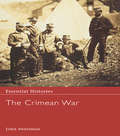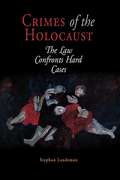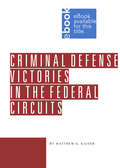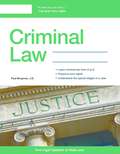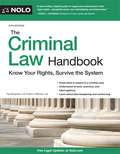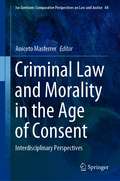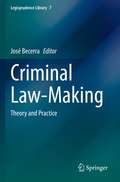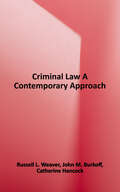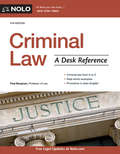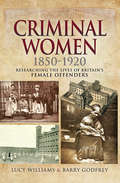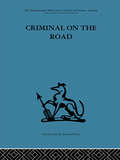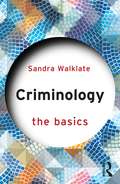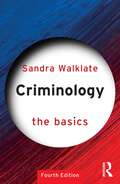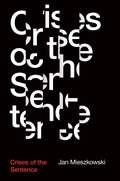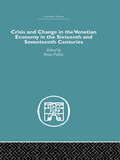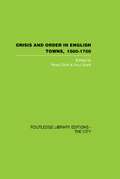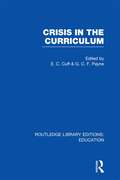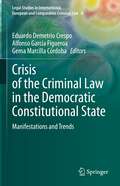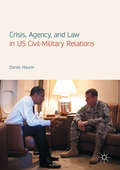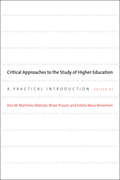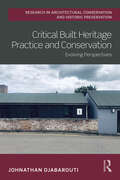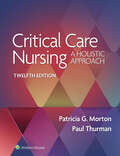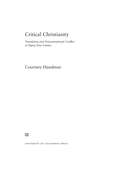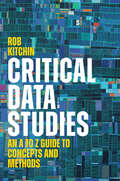- Table View
- List View
Crimean War: 1854-1856 (Essential Histories #2)
by John SweetmanFirst Published in 2001. Routledge is an imprint of Taylor & Francis, an informa company.
Crimes of the Holocaust
by Stephan LandsmanThe problem of prosecuting individuals complicit in the Nazi regime's "Final Solution" is almost insurmountably complex and has produced ever less satisfying results as time has passed. In Crimes of the Holocaust, Stephan Landsman provides detailed analysis of the International Military Tribunal prosecution at Nuremberg in 1945, the Eichmann trial in Israel in 1961, the 1986 Demanjuk trial in Israel, and the 1990 prosecution of Imre Finta in Canada. Landsman presents each case and elaborates the difficulties inherent in achieving both a fair trial and a measure of justice in the aftermath of heinous crimes. In the face of few historical and legal precedents for such war crime prosecutions, each legal action relies on the framework of its predecessors. However, this only compounds the problematic issues arising from the Nuremberg proceedings.Meticulously combing volumes of testimony and documentary information about each case, Landsman offers judicious and critical assessments of the proceedings. He levels pointed criticism at numerous elements of this relatively recent judicial invention, sparing neither judges nor counsel and remaining keenly aware of the human implications. Deftly weaving legal analysis with cultural context, Landsman offers the first rigorous examination of these problematic proceedings and proposes guideposts for contemporary tribunals. Crimes of the Holocaust is an authoritative account of the Gordian knot of genocide prosecution in the world courts, which will persist as a confounding issue as we are faced with a trial of Saddam Hussein. This volume will be compelling reading for legal scholars as well as laypersons interested in these cases and the issues they address.
Criminal Defense Victories in the Federal Circuits
by Matthew G. KaiserCriminal Defense Victories in the Federal Circuits is not your average, run-of-the-mill case digest. This collection of almost 200 case summaries, culled from all 11 Circuits and the D.C. Circuit, is as entertaining as it is informative. Author Matthew G. Kaiser explains the law and the rationale underlying the courts' decisions in a narrative style that is smart, thoughtful, witty, and highly readable. Criminal Defense Victories in the Federal Circuits: * Covers a broad range of topics, from Evidence & Trials to Federal Sentencing to Searches & Seizures and Tax Offenses. * Demonstrates the many ways a federal criminal defendant can win: The indictment may be dismissed; the case may be remanded for a new trial or resentencing; a conviction may be reversed. A victory may be based on substantive or procedural grounds; judicial error; juror misconduct; or prosecutorial overreaching. * Gives detailed attention to the facts of each case, as well as the court's legal analysis, so that you can apply the same winning strategy to your own cases with similar facts. * Includes dozens of short summaries - victories "in brief" - in addition to the nearly 200 detailed summaries, to jumpstart your research. * Celebrates the beauty of a well-written opinion (and the sweet sorrow of a well-reasoned dissent). * Highlights resourceful and zealous defense lawyering, with examples of techniques you can apply in your practice.
Criminal Law
by Paul BergmanDemystify criminal law. Criminal law can be a maze of conflicting principles, strange jargon, and confusing procedures. Professor Paul Bergman unravels the mysteries with an engaging plain English style that incorporates real life examples, famous films, and entertaining hypotheticals. From arraignment through sentencing, from "abuse excuse" to vigilante, this handy desk reference explains it all. You'll get answers to questions such as: * When can police officers enter your home? * Is cyber bullying illegal? * Is intoxication ever a criminal defense? * What are the "fruits of the poisonous tree"? * Can the police search your car? Criminal Law: A Desk Reference will assist students, bloggers, journalists, mystery writers, and anyone else interested in the criminal justice system or law enforcement.
Criminal Law 1: Law of Crimes
by P. Jaganathan Usha Jaganathan J. P. ArjunThe book "Criminal Law 1: Law of Crimes" provides a comprehensive overview of the Indian Penal Code (IPC) of 1860, addressing its various amendments and important recent case laws. Authored by P. Jaganathan and co-authors, the book is designed to aid law students and practitioners with its clear, student-friendly language and thorough coverage of the syllabus. It includes solved problems, previous university questions, and detailed explanations of key sections, offences, and punishments under the IPC. The book is structured to cater to the needs of students preparing for law examinations and competitive exams, making it a valuable resource for understanding criminal law in India.
Criminal Law Handbook, The: Know Your Rights, Survive the System
by Paul Bergman Sara J. BermanThe criminal justice system is complicated, understand it and your rights Criminal law is full of complex rules and procedures, but this book demystifies them. It explains how the system works, why police, lawyers, and judges do what they do, and what suspects, defendants, and prisoners can expect. It also provides critical information on working with a lawyer. In plain English, The Criminal Law Handbook covers: search and seizure arrest, booking, and bail Miranda rights arraignment plea bargains trials sentencing working with defense attorneys common defenses constitutional rights juvenile court preliminary hearings appeals, and public defenders victims’ rights This edition is completely updated, covering the latest Supreme Court rulings.
Criminal Law and Morality in the Age of Consent: Interdisciplinary Perspectives (Ius Gentium: Comparative Perspectives on Law and Justice #84)
by Aniceto MasferrerThis book discusses the relation between morality and politics, and morality and law, a field that has been studied for more than two thousand years The law is a part of human culture, and this touches upon a dynamic reality that is connected to the relation between nature and freedom, nature and culture. If such relations are not clearly understood, as is the case today, the relation between morality and law cannot be properly comprehended either. The relationship between morality and criminal law must constantly evolve to meet the needs of changing times and circumstances. Social changes and new situations require new answers. And since the relationship involves criminal law, legal philosophy and legal history, interdisciplinary approaches are always needed. Featuring fifteen original contributions by legal scholars from various European and American universities, the book does not pretend to solve the complexity of the relation between morality and criminal law, but instead expresses criticism, offers some proposals and stimulates further thought. The book tackles the topic from an interdisciplinary perspective (criminal law, constitutional law, legal philosophy and legal history, among others). As such, it appeals not only to scholars and students, but also to lawyers, policymakers, historians, theologians, philosophers and general readers who are interested in the legal, social, political and philosophical issues of our time.
Criminal Law-Making: Theory and Practice (Legisprudence Library #7)
by José BecerraThis book intends to contribute to the consolidation of the new approach to lawmaking that has taken place in the last 20 years in legal philosophy and legal theory, spreading to other legal fields, especially criminal law. This new legislation science focusing on criminal problems has triggered a growing interest in the field, a dynamic which has led to a long-needed convergence of disciplines such as administrative law, criminal law, criminology, political science, sociology and, of course, legal philosophy to contribute to a more rational decision-making process for the construct of criminal laws. With the intention to continue on with the building of a solid “Criminal Legislation Science”, this work presents scholars, lawmakers and students various emblematic approaches to enrich the discussion about different and promising tools and theoretical frameworks.
Criminal Law: A Contemporary Approach (Interactive Casebook Ser.)
by Russell L. Weaver Catherine Hancock John M. BurkoffThis state-of-the-art casebook is both easy and fun to use. It is designed to give you the basis for an enjoyable, comprehensive learning experience for your students, providing you with the sort of piquing materials that should prompt interested and insightful classroom discussion. The focus here is on teach ability, rather than encyclopedic coverage of the field. Many modern, cutting-edge cases and related features are included, as well as the classic decisions, making it possible for you to show students the most current issues in the law and the traditional doctrinal underpinnings of this area. Numerous problem-style hypotheticals are also included throughout, serving to stimulate and encourage thought and discussion but also to help you focus your students on practice-oriented, analytical skills. The book also contains updated cases that bring the book entirely up-to-date.
Criminal Law: A Desk Reference
by Paul BergmanUnderstand criminal law! Learn your rights and how to protect yourself. Whether you face a criminal case, work in law enforcement, or simply want to know more about the criminal law system, this book can help. Criminal Law: A Desk Reference covers the basic to the complex in alphabetical order. Whether it’s “alibi” or “writ of habeas corpus,” the book makes it easy to find and understand what you’re looking for. It even provides links to articles about the law in your state. With this book you’ll be able to: learn the law with real-life examples understand procedures from arraignment through sentencing determine defenses to common crimes examine actual criminal statutes understand juvenile court know how appeals work, and learn how to work with a lawyer. This edition has been thoroughly updated to reflect the latest criminal law trends and Supreme Court rulings.
Criminal Women, 1850–1920: Researching the Lives of Britain's Female Offenders
by Lucy Williams Barry GodfreyWomen are among the hardest individuals to trace through the historical record and this is especially true of female offenders who had a vested interest in not wanting to be found. That is why this thought-provoking and accessible handbook by Lucy Williams and Barry Godfrey is of such value. It looks beyond the crimes and the newspaper reports of women criminals in the Victorian era in order to reveal the reality of their personal and penal journeys, and it provides a guide for researchers who are keen to explore this intriguing and neglected subject.The book is split into three sections. There is an introduction outlining the historical context for the study of female crime and punishment, then a series of real-life case studies which show in a vivid way the complexity of female offenders lives and follows them through the penal system. The third section is a detailed guide to archival and online sources that readers can consult in order to explore the life-histories of criminal women.The result is a rare combination of academic guide and how-to-do-it manual. It introduces readers to the latest research in the field and it gives them all the information they need to carry out their own research.
Criminal on the Road: A Study of Serious Motoring Offences and Those Who Commit Them (International Behavioural And Social Sciences Ser. #Vol. 25)
by T. C. WillettTavistock Press was established as a co-operative venture between the Tavistock Institute and Routledge & Kegan Paul (RKP) in the 1950s to produce a series of major contributions across the social sciences. This volume is part of a 2001 reissue of a selection of those important works which have since gone out of print, or are difficult to locate. Published by Routledge, 112 volumes in total are being brought together under the name The International Behavioural and Social Sciences Library: Classics from the Tavistock Press. Reproduced here in facsimile, this volume was originally published in 1964 and is available individually. The collection is also available in a number of themed mini-sets of between 5 and 13 volumes, or as a complete collection.
Criminology: Doing Imaginative Criminological Research (The Basics)
by Sandra WalklateCriminology is a discipline that is constituted by its subject matter rather than being bound by an agreed set of concepts or way of thinking. This fully updated third edition of Criminology: The Basics is a lively and engaging guide to this compelling and complex subject. Topics covered include: the history and development of criminology myths about crime and offenders the search for criminological explanation victims of crime and state crime crime prevention, cybercrime, and the future of crime control criminology and intersectionality This edition also includes new sections on genocide, terrorism, cultural victimology, and Westo-centric thinking. Concise and accessible, this book utilises chapter summaries, exercise questions and lists of further reading to provide a perfect introduction to this subject.
Criminology: The Basics (The Basics)
by Sandra WalklateThe fourth edition of Criminology: The Basics has been fully revised and updated to offer an engaging and concise introduction to the main themes and concerns of this compelling and complex subject and gives an overview of the main theoretical and conceptual approaches to crime and justice. Topics covered include:• the history and development of criminology,• myths about crime and offenders,• the search for criminological explanation,• victims of crime and state crime,• crime prevention and the future of crime control,• criminology and intersectionality.The new edition has been expanded to include discussion of emerging themes in criminology, including the debates surrounding decolonizing the curriculum, the emergence of digital criminology and its impact on crime control and prevention, as well as ongoing scrutiny on violence against women. Authoritative and accessible, this book offers chapter summaries, exercise questions, and lists of further reading to provide a perfect introduction to this subject.
Crises of the Sentence
by Jan MieszkowskiThere are few forms in which so much authority has been invested with so little reflection as the sentence. Though a fundamental unit of discourse, it has rarely been an explicit object of inquiry, often taking a back seat to concepts such as the word, trope, line, or stanza. To understand what is at stake in thinking—or not thinking—about the sentence, Jan Mieszkowski looks at the difficulties confronting nineteenth- and twentieth-century authors when they try to explain what a sentence is and what it can do. From Romantic debates about the power of the stand-alone sentence, to the realist obsession with precision and revision, to modernist experiments with ungovernable forms, Mieszkowski explores the hidden allegiances behind our ever-changing stylistic ideals. By showing how an investment in superior writing has always been an ethical and a political as well as an aesthetic commitment, Crises of the Sentence offers a new perspective on our love-hate relationship with this fundamental compositional category.
Crisis and Change in the Venetian Economy in the Sixteenth and Seventeenth Centuries
by Brian PullanThe decline of Venice remains one of the classic episodes in the economic development of modern Europe. Its contrasts are familiar enough: the wealthiest commercial power in fifteenth-century Europe, the strongest western colonial power in the eastern Mediterranean, found its principal fame three centuries later in carnival and the arts. This metamorphosis from commercial hegemony to fashionable pleasure and landed wealth was, however, a complex process. It resulted not so much from the Portuguese voyages of discovery at the beginning of the sixteenth century as from increasing Dutch adn English competition at its end, and from industrial competition chiefly from beyond the Mediterranean. Several of the Articles Dr Pullan has chosen to illustrate these changes are made available in English for the first time, and two have been revised for this book. Four deal with the fortunes of entrepot trade and shipbuilding, which had furnished the basis of Venetian wealth adn influence in the Middle Ages; four others expamine the new fields of enterprise which Venice explored in the sixteenth and seventeenth centuries and which helped to compensate for the decline in traditional activities. This classic book was first published in 1968.
Crisis and Order in English Towns 1500-1700: Essays In Urban History
by Peter Clark Paul SlackThis collection of essays in English urban history covers a period which has been called 'the Dark Ages in English Economic History', on which it directs a revealing light. The essays range from a discussion of the role of ceremony in the civic life of Coventry at teh end of the Middle Ages to the influence of war on London Merchant class at the end of the seventeenth century. This book was first published in 1972.
Crisis in the Curriculum (Routledge Library Editions: Education)
by E. C. Cuff G. C. F. PayneThis collection of papers surveys key aspects of the curriculum, investigates the present situation and discusses what improvements need to be made. It is contributed by teachers, educational advisers and researchers and ranges across a variety of different institutional teaching settings and a variety of different subject areas. The approach is empirical rather than theoretical and the book is divided into three sections covering content, methods and evaluation.
Crisis of the Criminal Law in the Democratic Constitutional State: Manifestations and Trends (Legal Studies in International, European and Comparative Criminal Law #6)
by Eduardo Demetrio Crespo Alfonso García Figueroa Gema Marcilla CórdobaThe book shares the results of project research granted by the Castilla-La Mancha government, which has been composed by philosophers of law and criminal law researchers, whose main conclusions are represented by the manifestations and trends of the current crisis of the constitutional State. The works identify these trends and manifestations in order to develop alternatives and remedies to solve the current negation process that classical liberties are involved, from the point of view of philosophy, policy, and dogmatic.
Crisis, Agency, and Law in US Civil-Military Relations
by Daniel MaurerThis book develops a responsible and practical method for evaluating the success, failure, or “crisis” of American civil-military relations among its political and uniformed elite. The author’s premise is that currently there is no objectively fair way for the public at large or the strategic-level elites to assess whether the critical and often obscured relationships between Generals, Admirals, and Statesmen function as they ought to under the US constitutional system. By treating these relationships—in form and practice—as part of a wider principal (civilian)-agency (military) dynamic, the book tracks the “duties”—care, competence, diligence, confidentiality, scope of responsibility—and perceived shortcomings in the interactions between US civilian political authorities and their military advisors in both peacetime and in war.
Critical Approaches to the Study of Higher Education: A Practical Introduction
by Ana M. Martínez-Alemán, Brian Pusser, and Estela Mara BensimonAn essential guide to incorporating critical research into higher education scholarship.Winner of the Outstanding Publication Award of the Post-secondary Education Division of the American Educational Research AssociationCritical theory has much to teach us about higher education. By linking critical models, methods, and research tools with an advocacy-driven vision of the central challenges facing postsecondary researchers and staff, Critical Approaches to the Study of Higher Education makes a significant—and long overdue—contribution to the development of the field. The contributors argue that, far from being overly abstract, critical tools and methods are central to contemporary scholarship and can have practical policy implications when brought to the study of higher education. They argue that critical research design and critical theories help scholars see beyond the normative models and frameworks that have long limited our understanding of students, faculty, institutions, the organization and governance of higher education, and the policies that shape the postsecondary arena. A rigorous and invaluable guide for researchers seeking innovative approaches to higher education and the morass of traditionally functionalist, rational, and neoliberal thinking that mars the field, this book is also essential for instructors who wish to incorporate the lessons of critical scholarship into their course development, curriculum, and pedagogy.
Critical Built Heritage Practice and Conservation: Evolving Perspectives (Routledge Research in Architectural Conservation and Historic Preservation)
by Johnathan DjabaroutiCritical Built Heritage Practice and Conservation - Evolving Perspectives supports an alternative point of departure for engaging with the historic built environment, by critically questioning the legitimacy of dominant conservation concepts and methods that are often taken for granted within building conservation, architecture, and adaptive reuse. The meaning of heritage is changing. From pastness to presentness, from preservation to participation, and from tangible to intangible, heritage is increasingly understood as a dynamic, social, and intangible process across many disciplines. Consequently, the role and remit of the built heritage practitioner – and in particular the architectural conservationist – is becoming progressively complex and in need of a critical gaze. Is restoration really a falsehood from beginning to end? Should the condition of existing materials determine the conservation method? Is authenticity really an inherent quality within old buildings? By engaging with a critical interpretation of heritage, this book makes space for practitioners to consider the evolution of their own role within a rapidly changing context of built heritage practice. Reinforced by a shift in emphasis from materials to meanings, a ‘socio-material outlook’ is proposed which champions an enhanced focus on intangible heritage within the built heritage sector, whilst still acknowledging the physical condition of old buildings is a priority for many stakeholders. This book has been written with practitioners, students, and educators of architectural conservation in mind – although will also be of relevance to the broader built heritage industry; as well as academics, researchers, and heritage students with a passion for contemporary dialogues in heritage studies.
Critical Care Nursing: A Holistic Approach
by Paul Thurman Patricia Gonce MortonComprehensive, evidence-based, and expertly written, Critical Care Nursing: A Holistic Approach, 12th Edition, helps you confidently prepare today’s students for the highly specialized and complex challenges of critical care nursing practice. This trusted, must-have text integrates clear, concise writing, engaging resources, and a proven holistic approach to instill the clinical competence students need to care for patients who are critically ill and their families. More efficiently organized and easier to use than ever, the 12th Edition presents theory and principles within the context of practical application to streamline students’ transition to successful critical care practice.
Critical Christianity: Translation and Denominational Conflict in Papua New Guinea
by Courtney HandmanIn Critical Christianity, Courtney Handman analyzes the complex and conflicting forms of sociality that Guhu-Samane Christians of rural Papua New Guinea privilege and celebrate as "the body of Christ. ” Within Guhu-Samane churches, processes of denominational schism-long relegated to the secular study of politics or identity-are moments of critique through which Christians constitute themselves and their social worlds. Far from being a practice of individualism, Protestantism offers local people ways to make social groups sacred units of critique. Bible translation, produced by members of the Summer Institute of Linguistics, is a crucial resource for these critical projects of religious formation. From early interaction with German Lutheran missionaries to engagements with the Summer Institute of Linguistics to the contemporary moment of conflict, Handman presents some of the many models of Christian sociality that are debated among Guhu-Samane Christians. Central to the study are Handman's rich analyses of the media through which this critical Christian sociality is practiced, including language, sound, bodily movement, and everyday objects. This original and thought-provoking book is essential reading for students and scholars of anthropology and religious studies.
Critical Data Studies: An A to Z Guide to Concepts and Methods
by Rob KitchinCritical Data Studies has come of age as a vibrant, interdisciplinary field of study. Taking data as its primary analytical focus, the field theorises the nature of data; examines how data are produced, managed, governed and shared; investigates how they are used to make sense of the world and to perform practical action; and explores whose agenda data-driven systems serve.This book is the first comprehensive A-Z guide to the concepts and methods of Critical Data Studies, providing succinct definitions and descriptions of over 400 key terms, along with suggested further reading. The book enables readers to quickly navigate and improve their comprehension of the field, while also acting as a guide for discovering ideas and methods that will be of value in their own studies. Critical Data Studies is essential reading for students and scholars from across the sciences, social sciences and humanities, as well as those who work with data professionally who want to extend and enrich their conceptual and practical understanding of data and their use.This will be available as an Open Access book.
